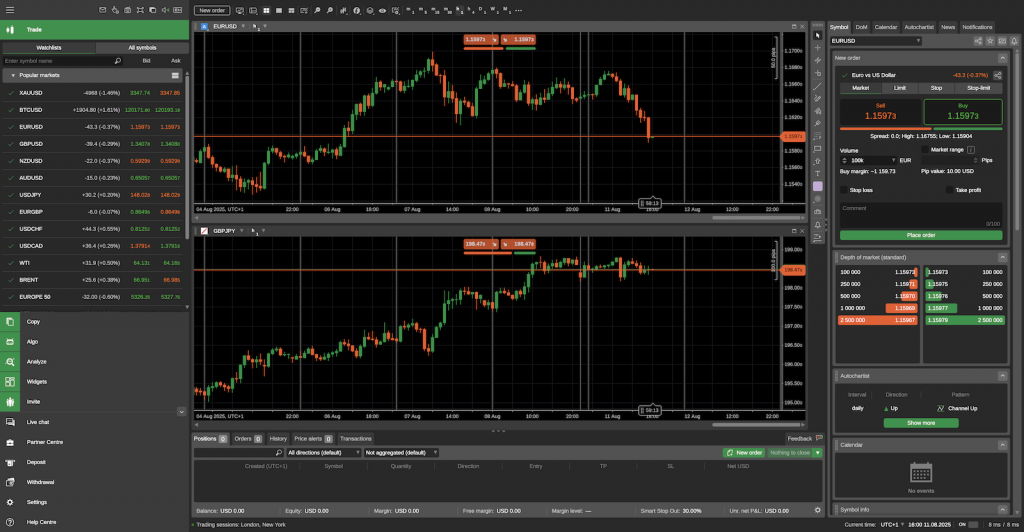Best ECN Brokers For Swing Trading 2026



When it comes to swing trading, execution speed, tight spreads, and transparent pricing can make all the difference between profit and loss.
ECN (Electronic Communications Network) brokers connect you directly to the market, offering faster trades and better pricing—perfect for swing traders looking to capitalize on short- to medium-term market moves.
We highlight the best ECN brokers for swing trading success.
Top Brokers With ECN Accounts for United States







How SwingTrading.com Chose The Top ECN Brokers
To find the best brokers for swing traders using ECN accounts, we tested a long list of platforms.
Each broker was scored (1–100) on factors that matter most to swing traders: execution speed, spreads, slippage, commissions, and liquidity. We evaluated how well their ECN setups supported holding trades over days or weeks, where consistency and cost efficiency make a real difference.
Our final rankings combine hard data with hands-on testing, highlighting brokers that deliver stable, low-cost ECN environments for swing traders.
How To Pick An ECN Broker
Fees & Spreads
ECN brokers typically display variable spreads—the gap between bid and ask prices—reflecting real-time market liquidity. While low spreads are attractive, you must also account for commissions, which usually range from $5 to $7 per round-trip.
To accurately assess trading costs, combine the spread cost with commissions to calculate the true expense per trade. This holistic view will help to optimize your cost structure over more extended holding periods.
Minimum Deposit Requirements
Selecting brokers with low minimum deposit thresholds can ease entry into the market. For instance, some ECN brokers accept no minimum deposits, making it accessible for beginners.
Conversely, other brokers require slightly higher deposits but offer advanced trading tools and superior execution, which might better suit more serious swing traders seeking enhanced capabilities.
Leverage Options
Most ECN brokers provide margin trading, enabling you to amplify your positions by borrowing capital. This leverage can significantly boost potential returns but also increases risk.
Some leading ECN brokers offer exceptionally high leverage ratios, up to 1:2000, ideal for experienced traders comfortable with aggressive strategies.
However, regulatory limits apply in many jurisdictions—CySEC, for example, restricts leverage to 1:30 for retail clients, which can affect trade sizing and risk management.
Account Tiers
ECN brokers often provide multiple account tiers to suit different trader profiles. True ECN accounts usually require larger deposits but reward users with lower fees and tighter spreads.
Beginners benefit from demo accounts, which allow risk-free practice with virtual funds under real market conditions. Micro accounts facilitate smaller trades for those easing into swing trading.
At the same time, some brokers offer localized accounts supporting specific currencies.
Trading Platforms
The choice of trading platform is critical in maximizing the ECN experience. Popular platforms like MetaTrader 4 (MT4), MetaTrader 5 (MT5) and cTrader are favored by most ECN brokers we’ve tested due to their seamless integration with ECN liquidity, fast execution speeds, and advanced charting tools.
These platforms enable you to conduct in-depth technical analysis and execute orders precisely, supporting effective multi-day trade management.
Regulation & Safety
Top-tier regulation is a hallmark of reputable ECN brokers, providing you with essential protections and transparency.
For example, brokers regulated by the UK’s FCA, Cyprus’s CySEC, or Australia’s ASIC adhere to strict standards that safeguard client funds and promote fair trading practices.
You should prioritize brokers with strong regulatory oversight to reduce counterparty risk and ensure compliance with industry best practices.
I’ve learned that the choice of an ECN broker isn’t just about chasing the lowest spreads—it’s about finding a partner that balances transparent costs, reliable execution, and responsive support.The subtle differences can make or break your trades held over several days, so taking the time to test a broker’s real-world performance is invaluable.
What Is An ECN Broker?
An ECN broker directly connects traders to a network of liquidity providers, enabling real-time order matching without a traditional dealing desk.
For swing traders, this means tighter spreads and reduced risk of price manipulation, crucial for capturing medium-term market moves with accuracy.
Unlike STP (Straight-Through Processing) brokers, ECN brokers charge a transparent commission, which often results in lower overall trading costs—critical when holding positions over several days.
Understanding this structure will help you optimize entry and exit points while managing slippage effectively.

The cTrader platform is popular with ECN brokers due to its seamless integration with ECN liquidity
Pros Of ECN Brokers For Swing Trading
- Superior pricing transparency: Unlike STP brokers that route orders through a limited set of liquidity providers and often mark up spreads, ECN brokers connect traders directly to a deep pool of multiple liquidity providers. This results in more competitive, tighter spreads and better price transparency—ideal for swing traders who need accurate entry and exit points over multi-day trades.
- Lower & more predictable slippage: ECN brokers benefit from a continuous order book where bids and offers come from multiple participants, reducing the likelihood of slippage compared to STP brokers, which can experience wider price variations due to less diverse liquidity sources. For swing traders, this means more reliable trade execution and fewer unexpected price gaps during volatile market moves.
- Greater scalability & liquidity: ECN brokers tap into extensive interbank networks with high volume and deep order books, unlike many STP brokers that rely on fewer liquidity sources. For swing traders, this means better order fills even during high-volatility periods or when trading less liquid instruments—minimizing partial fills and reducing the risk of price gaps that can erode profits over several days.
Cons Of ECN Brokers For Swing Trading
- Commission costs can add up: Unlike many STP brokers that embed fees into spreads, ECN brokers charge a separate commission per trade. For swing traders holding positions over several days and making multiple entries or exits, these commissions can accumulate and impact overall profitability, especially on smaller trade sizes.
- Variable spreads may widen during low liquidity: While ECN brokers offer tighter spreads during active market hours, their variable spreads can widen significantly during off-peak times or low-liquidity events. Swing traders holding overnight positions might face higher costs during these periods compared to the more stable fixed spreads offered by some STP brokers.
- Less support for fixed spread strategies: ECN brokers’ variable spreads make it harder to plan trades based on fixed cost assumptions. Swing traders using methods that rely on predictable spread costs may find ECN pricing less consistent, requiring more careful risk management and adaptability compared to STP brokers with fixed or semi-fixed spreads.
Leverage is a double-edged sword in swing trading—while ECN brokers often offer high leverage, I’ve found that disciplined use is key.Overleveraging can turn promising setups into quick losses, so selecting a broker that provides flexible margin options and transparent risk controls has been crucial to maintaining consistency in my trades.
Bottom Line
Choosing the best ECN broker for swing trading can significantly enhance your ability to capture market moves with precision and cost efficiency.
By offering transparent pricing, tighter spreads, and faster execution, the best ECN brokers provide a trading environment well-suited for holding positions over several days.
However, when swing trading, you should also consider commission costs and variable spreads to ensure the broker aligns with your specific strategy and risk tolerance.
